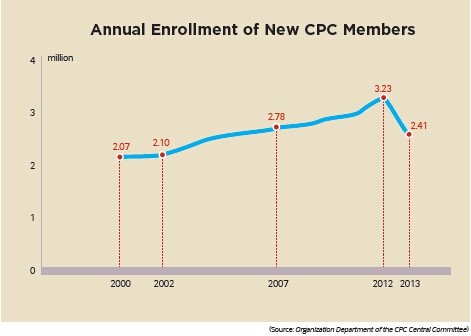|
Expelling the disqualified
The CPC Constitution stipulates that CPC members are the forefront of the Chinese working class, people and nation. But there are people who strove to join the Party in order to receive a push up the bureaucratic ladder or pursue personal interests in other ways, said Chen Shenghua, a professor at the China Executive Leadership Academy, Jinggangshan, a CPC cadre training institution in south China's Jiangxi Province.
Chen said that some Party members have become indifferent to the Party's role in society. Although they do not violate laws, their behavior does not follow conventional social morality and their professional manner is deeply flawed.
Therefore, the CPC has been exploring ways to phase out unqualified members who have not violated laws and Party discipline but whose conduct is nevertheless poor.
Huang Genbao was deemed unqualified for CPC membership by a democratic vote in a village-level Party committee in Jiangxi's Yichun City last year. The decision to eliminate him from the Party was endorsed in June.
Though he had been a CPC member for 40 years, Huang was unfamiliar with the process that led to his expulsion. Anyone leaving the CPC normally does so voluntarily or after being expelled by the Party's disciplinary organs for breaching codes of conduct. Neither situation applied to Huang.
The public discontent toward Huang emerged after he joined his son in abusing inspectors checking an unauthorized construction built by the latter last year. Though Huang had committed no formal violation of Party disciplines, the village's CPC committee held that his behavior was not befitting a CPC member.
The village committee's resolve needed to be reviewed by township- and county-level CPC committees before taking effect.
Yichun is one of the first cities in China to explore means of voting out Party members. Between 2003 and the end of June 2014, 674 CPC members were classified as unqualified and 114 similar to Huang were forced out. The city has around 220,000 Party members in total.
"Some people's discontent toward the CPC might simply stem from an incompetent Party member around them," Xin said. "So finding ways to root out unqualified members is necessary and must be dealt with earnestly."
The Yichun CPC Committee rules that local Party organizations should carry out democratic appraisals regularly to rid themselves of unqualified members.
Early in May 2013, Zhang Xi'en, a professor at Shandong University's School of Political Science and Public Administration, wrote an article in the People's Tribune, suggesting the CPC membership be cut by 30 million. People's Tribune is an academic magazine under People's Daily, the CPC's flagship newspaper.
Party leaders need to find a way to jettison corrupt and opportunistic members who had damaged the Party spirit. "Only if the Party keeps improving the quality and ability of its members can it ensure lasting rule," Zhang said.
Wang Wenzhang, a professor at the Institute of Social Development of Peking University, said that the number of members does not determine the overall quality of a political Party. The fundamental issue is renewing the party's management style. "This is no longer the era when the CPC had to tightly control loyal members to push for a revolution. A freer way of managing the members is now viable," he said.
While the CPC Constitution allows members to "quit freely," an invisible barrier has blocked the way out.
Cai Zhiqiang, a professor of Party building at the Party School of the CPC Central Committee, said that there's a prevalent yet mistaken concept that only traitors will quit, and they are usually discriminated against. "Those members who choose to leave need to be treated fairly," he said.
Cai said that the Party should raise the bar for accepting new members to ensure creativity and vitality in the Party. "The punishment of unqualified members should also be strictly in line with Party regulations," he added.
Email us at: yinpumin@bjreview.com

Party Statistics at the End of 2013
- 86.69 million members, up 1.8 percent year on year;
- More than 4.3 million basic-level organizations across the country, up 2.4 percent from a year earlier;
- Nearly 1.63 million organizations in private companies, accounting for 58.4 percent of the national total, up 4.1 percentage points from the previous year;
- 21.09 million female members, accounting for 24.3 percent of the national total;
- 5.95 million members from minority ethnic groups, constituting 6.9 percent of the national total;
- 22.38 million members at or below 35 years old;
- 36.07 million members with junior college education or above.
(Source: Organization Department of the CPC Central Committee) | 